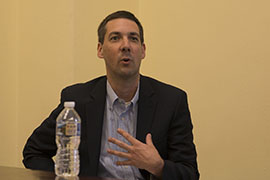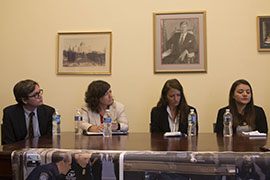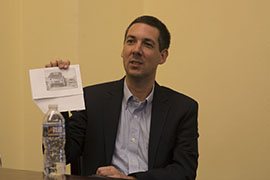- Slug: BC-CNS-Border Policing,660
- Photos available (thumbnails, captions below)
By SOPHIA KUNTHARA
Cronkite News
WASHINGTON – ACLU attorneys from Southwest border states said Tuesday that a lack of reporting on stops by Customs and Border Protection officers opens the door to police abuse and makes it difficult to hold officers accountable for their actions.
Putting more boots on the ground would be “devastating” to border communities, where residents often have run-ins with border officers that go undocumented, said James Duff Lyall, an attorney with the American Civil Liberties Union in Tucson. What communities need instead is more police accountability.
“At a time when the administration, law enforcement experts, many people are talking about the need for 21st century policing, the Border Patrol has yet to join the 20th century in terms of best practices, police practices,” Lyall said.
He was in Washington with members of ACLU chapters in New Mexico and Texas to demand greater internal accountability for CBP, especially when it comes to officers’ interactions with people. The agency cannot hold officers accountable for their actions during stops at checkpoints, Lyall said, without the data to back it up.
“There is no reason the nation’s largest law enforcement agency could not collect basic data so that the agency itself, as well as the public, can know what agents are doing,” Lyall said.
“Are they complying with the law, are they using taxpayer resources in an efficient and effective way or are there problems? And nobody can assess any of that if there’s no basic data for stops that do not result in arrest,” he said.
Neither officials with Customs and Border Patrol nor the union that represents its rank-and-file officers returned calls seeking comment on the ACLU allegations Tuesday. Calls to other border police agencies were not returned.
Border Patrol has been working toward greater accountability, however, establishing the National Use of Force Review Board in December 2014 to follow up on incidents involving the discharge of a firearm or use of force that results in serious injury or death. It can make recommendations for policy improvements, even in those cases where the officer’s action was in compliance with regulations, releasing a batch of such reviews this summer.
But Victoria Gaubeca, director of the ACLU of New Mexico Regional Center for Border Rights, said more needs to be done.
She said the ACLU is calling for policies prohibiting the use of race and ethnicity in officer stops, more and better data collection, a better complaint system and better implementation of policies.
“There’s this attitude of treating the border residents as if we’re the enemy, so to speak, and having to justify who we really are,” Gaubeca said, citing examples of U.S. citizens being questioned extensively about their legal status.
In Tucson, Lyall said, there have been charges of excessive use of force, abuse in detention facilities and a lack of data collection for stops – some of which he said occurred outside the 100-mile border zone where the agency has authority. The ACLU has filed multiple lawsuits concerning border issues in Tucson, including one addressing conditions in detention facilities.
But some of that could be resolved if there was more data to help deter data collection unlawful practices, said Lyall, who works with the ACLU’s Border Rights project.
“We have agents stopping people many, many miles from any border with no record of having to provide any reason or having to justify the stop in any way,” he said.
Lyall added that there could be more accountability if there were more resources dedicated to reviewing and addressing complaints.
“You can’t imagine LAPD or NYPD not having internal affairs,” he said of the Los Angeles and New York police departments.
Lyall said the Border Rights project was started in part because of the rapid expansion of CBP, and he does not believe more officers are necessarily good for border communities.
“What does security mean when you have border communities that are far more fearful of federal law enforcement agents in their community than anything else?” Lyall asked.
^__=
Web Links:
_ ACLU lawsuits: http://www.acluaz.org/BorderLitigationProject
_ Use of Force Review Board report: https://www.cbp.gov/newsroom/stats/cbp-use-force/case-summaries
^__=
James Duff Lyall, an ACLU attorney based in Tucson, said more accountability for border patrol agents will not come without more data on stops and artests by officers. (Photo by Sophia Kunthara/Cronkite News)
ACLU attorneys and residents of Southwest border towns called on Customs and Border Protection to improve its data collection practices for greater agency accountability. (Photo by Sophia Kunthara/Cronkite News)
ACLU of Arizona attorney James Duff Lyall said U.S. Customs and Border Protection has not adopted modern policing practices for its officers, opening the door to abuses. (Photo by Sophia Kunthra/Cronkite News)


